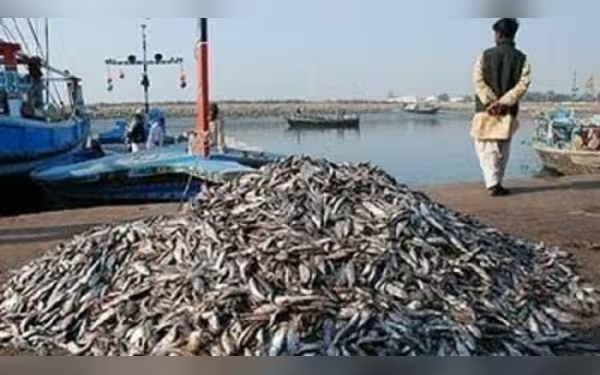Saturday, November 16, 2024 06:33 PM
Sindh CM and Federal Minister Address Fishermen's Challenges
- Sindh CM discusses fishing industry issues with Federal Minister.
- Joint committee to tackle fishing trawler licensing concerns.
- Keti Bandar port development could boost local economy.
 Image Credits: brecorder
Image Credits: brecorderSindh CM and Federal Minister discuss critical issues facing fishermen and marine ecosystems, including Keti Bandar port development.
KARACHI: The fishing industry in Pakistan, particularly in Sindh, faces numerous challenges that threaten the livelihoods of local fishermen and the health of marine ecosystems. Recently, Sindh Chief Minister Syed Murad Ali Shah and Federal Minister for Maritime Qaiser Shaikh convened at the CM House to address these pressing issues. Their discussions centered on the plight of fishermen, the alarming levels of sea pollution, and the potential development of Keti Bandar as a new port to ease the burden on existing ports.
At the heart of their conversation was the detrimental impact of fishing trawlers on fish populations. These trawlers are notorious for depleting fish resources by destroying young fish seedlings. In response to this crisis, the Chief Minister highlighted that his government has already imposed a ban on certain sensitive fishing nets, specifically the Bulloo and Gujjo types. However, a significant challenge remains: determining which licenses issued by the government allow for the operation of these trawlers. To find a solution, both leaders agreed to establish a joint committee that will include representatives from the Maritime Ministry and the provincial governments of Sindh and Balochistan.
Another critical issue discussed was the discharge of untreated wastewater into the sea, which exacerbates pollution and harms marine life. The Chief Minister informed the federal minister about the West Karachi Water Recycling Project, an initiative aimed at addressing this problem. This project encompasses several components, including new inlet works linked to an interceptor sewer, a 35 million gallons per day (MIGD) integrated wastewater treatment plant, and a pipeline designed to discharge reverse osmosis concentrate into the river. Additionally, a pumping station and pipe network are being developed to supply 28 MIGD of recycled water to industries in the SITE area. The Chief Minister expressed optimism, stating that the project has moved beyond the tender stage and is set to be awarded soon.
Furthermore, the leaders discussed the installation of a Combined Effluent Treatment Plant, emphasizing the need for collaboration between provincial and federal governments to make this project a reality. As they explored the current state of sea traffic, it became evident that both Karachi Port and Port Qasim are struggling to manage the increasing volume. This situation underscores the urgent need for an additional deep port, such as Keti Bandar, which is strategically connected to the National Highway and motorway, facilitating the efficient transportation of goods to inland areas.
The Keti Bandar project was initially approved as part of the China-Pakistan Economic Corridor (CPEC) initiatives, but for reasons that remain unclear, it has not progressed. The federal minister expressed his commitment to revisiting this issue within his ministry and seeking a private partner to help establish the port. Both leaders agreed to reconvene soon to assess the progress made on the decisions taken during their meeting.
The discussions between Sindh's Chief Minister and the Federal Minister for Maritime highlight the critical need for collaborative efforts to address the challenges facing the fishing industry and marine environment. As these leaders work towards solutions, the future of Sindh's fishermen and the health of its waters depend on their ability to implement effective strategies. The development of Keti Bandar could not only alleviate pressure on existing ports but also provide a much-needed boost to the local economy, ensuring that the fishing community can thrive sustainably.













